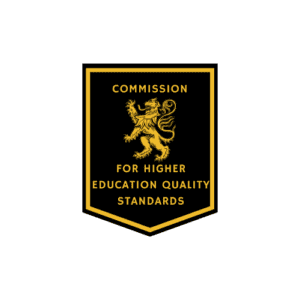CHEQS Council of Higher Education Quality Standards

The CHEQS Commission for Higher Education Quality Standards
The CHEQS Commission for Higher Education Quality Standards (CHEQS) was founded in
1996 under the leadership of the Chartered Leadership Institute, with a focus on business principles.
Today, CHEQS is a globally recognized accreditation body that upholds the highest standards in professional
development, education, and skills certification. Our recognition extends to accredited courses, program
exams, and college education programs worldwide.
Based in both the EU and USA, CHEQS is accredited in Europe and adheres to ISO 21001 and ISO
29993 standards. We recognize and partner with hundreds of educational and training institutions to maintain the
highest standards of quality.
Global Accreditation Standards
CHEQS collaborates with industry-leading organizations, including ACBSP, TUV, ISO Standards, Arab Academy, ESQ Europe, SIS Cert, and others, ensuring that we provide the most comprehensive and
reputable accreditation process. We also recognize existing courses that are government-recognized,
including exams and educational programs. Our Quality Management Board evaluates and accredits programs
based on these internationally recognized standards.
By accrediting top-tier companies for Professional Development (PD) and VIP Education Worldwide, CHEQS guarantees that graduates from accredited courses
are recognized globally for their commitment to quality.
CHEQS Commitment
All CHEQS members agree to adhere to the standards outlined on this website, which focus on
enhancing the quality of education worldwide.
Key Factors Contributing to Higher Education Standards
Higher education standards are essential for ensuring the quality and effectiveness of
academic programs. The following 20 factors are key to achieving these standards:
-
Accreditation: Institutions and programs should be accredited by
recognized accrediting bodies to meet specific quality standards.
-
Curriculum Design: A well-structured, up-to-date curriculum that aligns
with program objectives and industry requirements.
-
Learning Outcomes: Clearly defined learning outcomes that specify what
students are expected to achieve upon completing the program.
-
Qualified Faculty: Highly qualified and experienced faculty members with
relevant academic and professional backgrounds.
-
Teaching Methods: Effective teaching methodologies that promote active
learning and student engagement.
-
Research and Scholarship: Encouraging and supporting faculty research
and scholarly activities to contribute to knowledge advancement.
-
Student Support Services: Providing academic advising, counseling, and
career guidance to support students throughout their academic journey.
-
Assessment and Evaluation: Ongoing assessment of student performance and
program effectiveness for continuous improvement.
-
Resources and Facilities: Sufficient resources, including libraries,
laboratories, and technology, to support academic activities.
-
Student Engagement: Opportunities for students to participate in
extracurricular activities, clubs, and organizations to enhance personal and professional
development.
-
Quality Assurance: Implementing processes to monitor and maintain
educational standards.
-
Recognition of Prior Learning: Offering mechanisms to recognize and
credit prior learning and work experience.
-
Student Success Initiatives: Programs designed to improve student
retention, graduation rates, and overall success.
-
Collaboration with Industries: Partnerships with industries to ensure
academic programs meet job market needs.
-
Technology Integration: Effectively integrating technology into the
learning process to enhance education delivery.
-
Global Perspective: Incorporating global perspectives and cross-cultural
understanding into the curriculum.
-
Institutional Governance: Strong governance and leadership to ensure
sound decision-making and accountability.
-
Continuous Improvement: A commitment to continuous improvement based on
feedback from students, faculty, alumni, and external stakeholders.
| 
